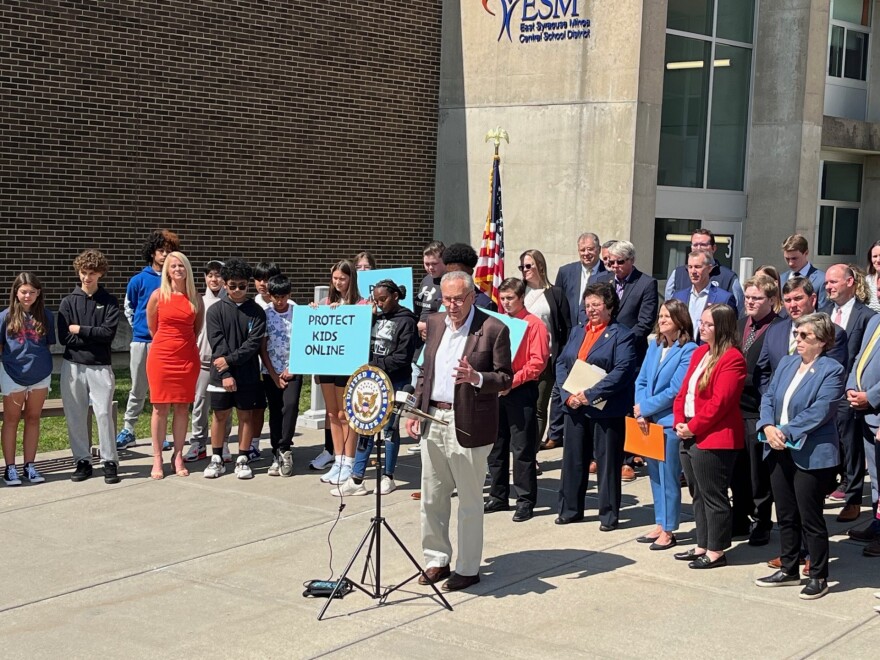Children and teens' safety while online is one of the paramount concerns of Central New York parents. Legislation in Congress could go a long way toward boosting protections. Two measures that overwhelmingly passed in the U.S. Senate are languishing in the House.
Parents, district leaders, and others joined Senate Majority Leader Chuck Schumer Tuesday in front of Pine Grove Middle School in East Syracuse to show their support for legislation that would hold social media companies accountable for their content.
“They're evil companies that target these kids and lure them in so they can do advertising. It's just gross," Schumer said. "And we now will be able to stop them and tell the social media that they have a responsibility to stop them.”

Schumer says algorithms prey on vulnerable kids and teens who fall victim to eating disorders, anxiety, depression, and suicide.
Mary Rodee of Potsdam has relentlessly advocated for both the Kids Online Safety Act AND Children and Teens’ Online Privacy Protection Act since her son Riley Basford committed suicide more than three years ago. She says her son was a victim of sextortion.
“He was 15 years, nine months and 27 days old when a sinister stranger from the Ivory Coast who pretended to be a beautiful young woman named Meghan Miller, found him and friended him on Facebook.”

Rodee says the "woman" sent Riley explicit photos, and convinced him it was safe to send some in return. He did, and she said if he didn’t send $3,500, she would share the photo with everyone he knew. Six hours later, Riley killed himself.
“Sexstorting children is a crime, right?" Rodee said. "Child porn is a crime. Child sexual abuse material is a crime. Drugs are a crime. But this is criminal already and it's running rampant on these platforms and nothing's stopping it.”
Rodee says she has no legal recourse other than the legislation in Congress. No one can identify the online "woman," and the U.S. does not extradite from the Ivory Coast.
Schumer is pressuring the House to take it up when it returns next week and vote on it before the election. Republican leadership says they won’t bring the bills up for a vote.

Below are some of the provisions of the legislation as provided by Sen. Schumer's office.
The Kids Online Safety Act (KOSA) will create more requirements for platforms to create a safe online environment for kids and teens. The bipartisan bill will:
· Require platforms to give kids and teens the option to protect their data and opt out of algorithmic recommendations.
· Allow parents to control how their kids’ information is used and require platforms to create a dedicated channel to report harmful behavior.
· Obligate platforms to prevent and mitigate dangers to minors by limiting the promotion of harmful behavior such as suicide, eating disorders, substance abuse, and sexual exploitation.
· Require independent audits to research how social media platforms impact kids’ and teens’ mental health and well-being.
· Fosters research regarding harms to the online safety of minors by requiring the National Academies to study the impact of social media on youth.
The Children and Teens’ Online Privacy Protection Act (COPPA 2.0) strengthens online privacy protections for kids and teens. The bipartisan bill builds on the original Children and Teens’ Online Privacy Protection Act signed into law in 1998 which created protections for children under the age of 13, and will:
· Prohibit internet companies from collecting data from users under the age of 17 without their consent, increasing the age from COPPA’s legislation.
· Ban advertising that targets kids and teens.
· Revise the requirement established in COPPA that obligates platforms to protect kids and teens if they have “actual knowledge” of their age, instead covering all platforms that are “reasonably likely to be used” by kids and teens.
· Require companies to allow the deletion of data for kids and teens when possible by creating an “eraser button.”
If you or anyone you know is considering suicide, call the crisis hotline at 988.



